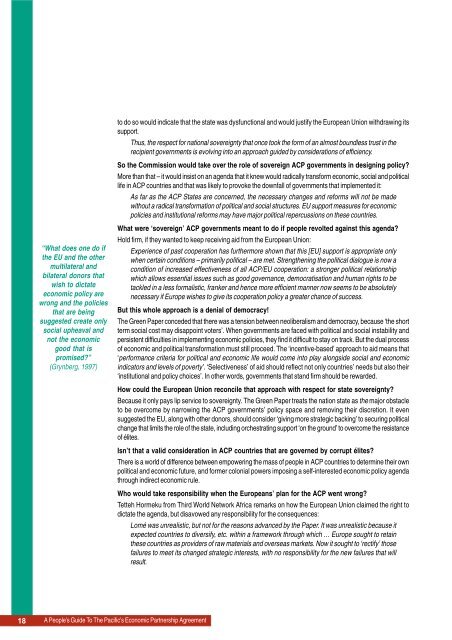REPA Booklet - Stop Epa
REPA Booklet - Stop Epa
REPA Booklet - Stop Epa
Create successful ePaper yourself
Turn your PDF publications into a flip-book with our unique Google optimized e-Paper software.
to do so would indicate that the state was dysfunctional and would justify the European Union withdrawing its<br />
support.<br />
Thus, the respect for national sovereignty that once took the form of an almost boundless trust in the<br />
recipient governments is evolving into an approach guided by considerations of efficiency.<br />
So the Commission would take over the role of sovereign ACP governments in designing policy?<br />
More than that – it would insist on an agenda that it knew would radically transform economic, social and political<br />
life in ACP countries and that was likely to provoke the downfall of governments that implemented it:<br />
As far as the ACP States are concerned, the necessary changes and reforms will not be made<br />
without a radical transformation of political and social structures. EU support measures for economic<br />
policies and institutional reforms may have major political repercussions on these countries.<br />
“What does one do if<br />
the EU and the other<br />
multilateral and<br />
bilateral donors that<br />
wish to dictate<br />
economic policy are<br />
wrong and the policies<br />
that are being<br />
suggested create only<br />
social upheaval and<br />
not the economic<br />
good that is<br />
promised?”<br />
(Grynberg, 1997)<br />
What were ‘sovereign’ ACP governments meant to do if people revolted against this agenda?<br />
Hold firm, if they wanted to keep receiving aid from the European Union:<br />
Experience of past cooperation has furthermore shown that this [EU] support is appropriate only<br />
when certain conditions – primarily political – are met. Strengthening the political dialogue is now a<br />
condition of increased effectiveness of all ACP/EU cooperation: a stronger political relationship<br />
which allows essential issues such as good governance, democratisation and human rights to be<br />
tackled in a less formalistic, franker and hence more efficient manner now seems to be absolutely<br />
necessary if Europe wishes to give its cooperation policy a greater chance of success.<br />
But this whole approach is a denial of democracy!<br />
The Green Paper conceded that there was a tension between neoliberalism and democracy, because ‘the short<br />
term social cost may disappoint voters’. When governments are faced with political and social instability and<br />
persistent difficulties in implementing economic policies, they find it difficult to stay on track. But the dual process<br />
of economic and political transformation must still proceed. The ‘incentive-based’ approach to aid means that<br />
‘performance criteria for political and economic life would come into play alongside social and economic<br />
indicators and levels of poverty’. ‘Selectiveness’ of aid should reflect not only countries’ needs but also their<br />
‘institutional and policy choices’. In other words, governments that stand firm should be rewarded.<br />
How could the European Union reconcile that approach with respect for state sovereignty?<br />
Because it only pays lip service to sovereignty. The Green Paper treats the nation state as the major obstacle<br />
to be overcome by narrowing the ACP governments’ policy space and removing their discretion. It even<br />
suggested the EU, along with other donors, should consider ‘giving more strategic backing’ to securing political<br />
change that limits the role of the state, including orchestrating support ‘on the ground’ to overcome the resistance<br />
of élites.<br />
Isn’t that a valid consideration in ACP countries that are governed by corrupt élites?<br />
There is a world of difference between empowering the mass of people in ACP countries to determine their own<br />
political and economic future, and former colonial powers imposing a self-interested economic policy agenda<br />
through indirect economic rule.<br />
Who would take responsibility when the Europeans’ plan for the ACP went wrong?<br />
Tetteh Hormeku from Third World Network Africa remarks on how the European Union claimed the right to<br />
dictate the agenda, but disavowed any responsibility for the consequences:<br />
Lomé was unrealistic, but not for the reasons advanced by the Paper. It was unrealistic because it<br />
expected countries to diversify, etc. within a framework through which … Europe sought to retain<br />
these countries as providers of raw materials and overseas markets. Now it sought to ‘rectify’ those<br />
failures to meet its changed strategic interests, with no responsibility for the new failures that will<br />
result.<br />
18<br />
A People’s Guide To The Pacific’s Economic Partnership Agreement
















